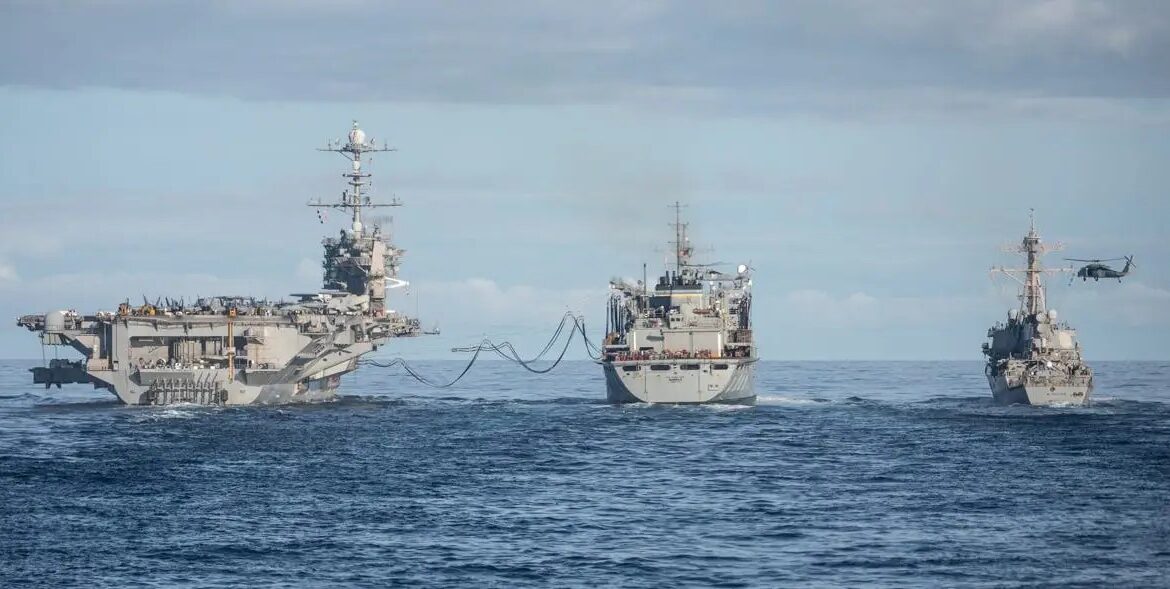If China imposed a maritime blockade of Taiwan, the U.S. and its allies would have the capability to break it, says Adm. Samuel Paparo, commander of the U.S. Pacific Fleet.
China certainly has "the number of vessels, and the capability at sea to execute a blockade," Paparo told Nikkei and a group of reporters traveling with U.S. Secretary of Defense Lloyd Austin to Hawaii last week.
"The question that follows is 'Do the allies have the capability to break that blockade?' And the answer to that is a resounding yes."
Paparo expressed confidence that Washington could do so even on its own, citing its volume of firepower and "superiority in key domains," likely a reference to nuclear submarines and other undersea forces.
But a U.S. defense official raised concerns that Beijing could use other means to cut off maritime access to Taiwan while concealing its intention to do so.
When China conducted large-scale military drills in August, it designated exercise areas near the Taiwanese ports of Taipei and Kaohsiung. Chinese forces fired 11 ballistic missiles during the drills, and there was a nonzero risk that one could have landed outside these zones.
The exercises forced civilian vessels and aircraft to change their routes. "That's a pretty significant impact on normal activities," the official said.
The line between warning civilian ships in advance of military exercises to keep them safe, and imposing a blockade to keep them out, is blurry.
"You could essentially blockade Taiwan's access, through the repeated imposition of these kinds of closure areas, legally, safely, and in a way that would be extraordinarily difficult, either for Taiwan or the U.S., to challenge and to counter," the defense official said.
Beijing could deny any U.S. accusations that it intended to impose a blockade. And if Washington could not conclude definitively that one was in place, it would not be able to conduct an operation to break it.
The question for China is whether a blockade could achieve its goal of unifying Taiwan with the mainland.
A senior Taiwanese official asserted that Taipei would not bow to Chinese pressure.
"I think the Chinese pressure campaign, coercion campaign, has proven to be counterproductive," the official said. "These coercive measures not only strengthens our people's determination, our will, to defend our own democracy, but also rally international support to Taiwan."
Jacob Stokes, a fellow in the Indo-Pacific security program at the Center for a New American Security, considers it unlikely that Beijing would be able to achieve unification through a blockade, but noted that Taiwan, being "highly integrated into and reliant on global trade," would be vulnerable to that tactic.
"Taiwan's government could do more to prepare its citizens for surviving a blockade by stockpiling basic necessities like food, fuel, and medical supplies," he said.
The U.S. defense official predicted that should a blockade prove ineffective, China would escalate tensions through other means, such as taking over smaller islands under Taipei's control.
That would create a narrative that "'we can do the same thing to the big island. Don't make us prove it,'" the official said.
The Kinmen and Matsu islands near the Chinese province of Fujian, along with the island of Taiping in the South China Sea, are seen as particularly tough to defend.
The U.S. has no legal obligation to come to Taiwan's defense. Getting Washington to go to war with Beijing in a scenario short of an attack on the main island could be a tough ask, and would ultimately be a political decision. U.S. President Joe Biden has stated that Washington would defend Taiwan if China invaded, but has provided no details.
"Part of the reason that we need to be forward in the theater is to have the capability of being able to react to" a conflict in areas like Taiping, the defense official said.
"The fact that we need to be in the contested spaces is critical towards our ability to give our leaders options."


